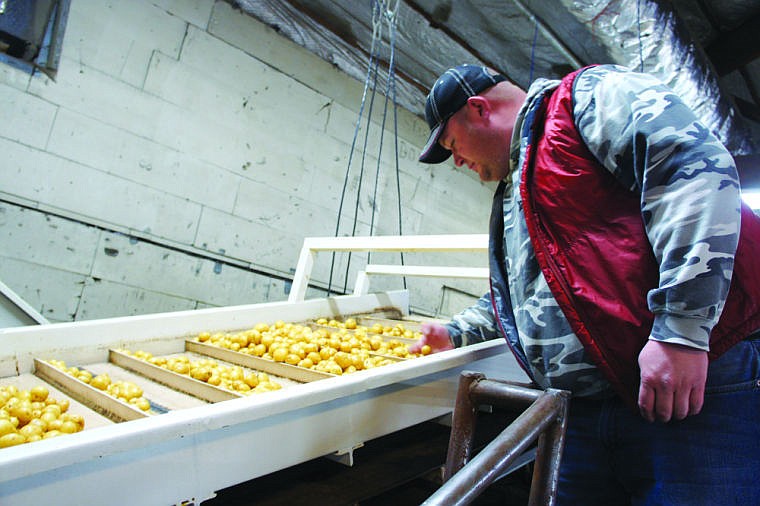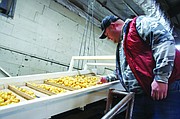Potato Commissioner sees need for growers to be involved
"I get paid for playing in the dirt and that's pretty awesome," Washington State Potato Commissioner Nick Johnson says with a smile. The 34-year-old, fourth generation farmer and business owner adds that at the end of the day he has a sense of accomplishment. "I get to say, 'I did this.'"
Johnson works with his father and uncle at Johnson Agriprises where they grow potatoes, wheat, onions, bluegrass, asparagus, mint, and other commodities on over 10,000 acres. The fields are both Project land and dryland and Johnson Agriprises has the famous GO COUGS potato storage on Highway 26 east of Othello. Johnson also recently purchased Pacific Produce in Bruce, a fresh pack operation. "It can be overwhelming at times but there are good people that make this place run. I'm very appreciative of the hard work they do," Johnson says.
A potato commissioner since 2009, Johnson currently serves as Chair of the Finance Committee which also puts him on the Executive Committee. He was elected in a special election as another commissioner stepped down. He said he had no competition so he won. He decided to become involved with the Commission after attending a leadership course and seeing how important it was. "Takes people being involved to educate others about these issues. I saw it as a good use of time and effort," Johnson explains.
"Sometimes it feels like we're the enemy," Johnson says of farmers. He points out that U.S. farmers grow the safest food in the world. And it is the cheapest, according to Johnson, adding the U.S. is the only country where food costs only 10% of income. "Americans have access to any food they want and it's safe." But Johnson thinks that people take that for granted: "We're not appreciated for what we do." To help growers, "The Commission spends a lot of time talking to government agencies and members of Congress to explain our situation."
"I don't think we should have issues that involve the federal government in what we do," Johnson says. But he adds, "These issues are not going to go away and it's going to take people to educate these agencies and members of congress and this is my way to get involved. If my kids want to farm I want them to be able to do that and if that means talking to senators than that's what it takes." Johnson says the Commission makes "four or five" trips to Washington D.C. every year and he'd like to see more growers involved. The commission is heavily involved with state and federal agencies, Johnson says, and in constant contact with state and federal lawmakers.
The commission is "just a good bunch of people to work with," Johnson explains. "We learn as much from them as they learn from us." Johnson says if more growers were involved in the Commission then they would stay better informed on issues affecting them. "If nothing else so we don't hear, 'I didn't know.'" The potato industry has "good state and national organizations," Johnson says and they are "good groups to work with."
Johnson says there always seems to be new challenges on the process side of potato growing such as zebra chip or acrylamide. He sees a lot of growth potential for frozen processing with exports going to growing markets on the Pacific Rim or South America. He points out that already 90% of the frozen market in Washington State is exported.
On the fresh side, Johnson says there are new varieties such as "marble-sized" reds and yellows. "We're having to approach potato growing from a different angle." The smaller potatoes cook quicker and that fits in with people's busy lives, Johnson points out. It takes 10 minutes to cook a potato rather than an hour, he says. The small potatoes also require about half the water to grow and are planted in June and harvested in September. "Five years ago we threw those away and now they are the ones that pay the most." But it's been a challenge to harvest them, treat them gently, get them to the fresh pack, and package them accurately by size. "So far we've been able to do that."
Johnson's wife of eight years, Kate, is also a fourth-generation farmer. According to Johnson she supports his work with the Potato Commission. "Growing up on a farm she understands the trials we're up against and we have to fight the fight."
Johnson enjoys "lots of things" about farming. "Being outdoors, watching a crop grow. Take a kernel of wheat or a chunk of potato and watch it turn into food." He shares his love with his children, taking them out and showing them the growing crops. "They love being outside especially if there's a tractor involved."
Johnson's family has been in the Columbia Basin since 1906 when Johnson's great-grandfather settled in the area. Johnson says he loves going out to the farm with his father and uncle. "I can't imagine growing up anywhere else. Growing up on a farm in the Columbia Basin is a great way to raise kids." Johnson and his wife are raising two children: three-and-a-half-year-old daughter Kamryn and one-year-old son Wyatt. Johnson prefers to spend his free time with his family. "We're not done at 5 o'clock" and sometimes there are late nights. "Keeping up with a three and a half year old doesn't leave time for much else." And his daughter "Always has something to say," he adds with a smile.





